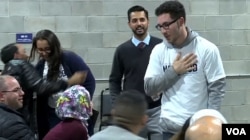Muslim Americans are preparing for life under a new president who last December proposed banning foreign Muslims from entering the United States.
President-elect Donald Trump later walked back such a blanket ban, instead saying people from countries flagged as terrorism concerns would be subject to “extreme vetting.”
Those comments made many Muslim Americans wary of his candidacy. At a watch party at the Arab-American National Museum in Dearborn, Michigan, many were shocked at his victory and told VOA they are concerned about what his presidency will mean.
“Trump has run on racism and bigotry,” said Abdullah Hammoud, who won a seat in the Michigan state legislature on Tuesday. “He has monetized it, in fact, in exchange for votes, and we see the results of which on TV. And it is a scary thought.”
Despite winning his race for the Michigan House of Representatives, election night was filled with mixed emotions for the 26-year-old Democrat.
"It is a strange contrast, right? For the first time in Dearborn's history, they have elected an Arab-American Muslim, first generation," he said, "and at the statewide level, we may be supporting Trump, and at the national level, a Trump presidency.”
Splitting a Trump-led ticket
Hammoud knows some people in his district supported him while also voting for Trump on the same ballot. The possible reasons Michigan voters chose Trump over Hillary Clinton trouble him.
“It is scary that I was with my family earlier today, and I was celebrating," Hammoud said. "Tomorrow, I may wake up and speak to my mother and my sister, who wear the hijab, and tell them to be careful when they leave outside the front door."
Asha Noor works as an advocacy specialist for the Arab Community Center for Economic and Social Services (ACCESS). For her, the election was a reminder of the racial and religious divides that continue to exist in America.
“It shows, to me, that racism and bigotry have prevailed,” she said. “It shows me that I have never lived in a post-racial society. And it shows me that certain communities are not wanted in this society.”
But rather than be consumed with apprehension and fear, Noor says she is ready to take action and resume her activism.
“Get our message out there. Show people who we are. Show them that we are not going anywhere,” she said. “This is our country as much as it is anyone else’s country. We contribute, and we have always contributed to this country.”
Arab American News newspaper publisher Osama Siblani says many Muslim Americans voted for Hillary Clinton, but were not enthusiastic about her candidacy.
“They are very disgusted with the election. I do not believe that Muslim Americans and Arab-Americans have a favorite candidate," Siblani said. "They probably are voting for Clinton just because they are against Donald Trump, not because they think Hillary Clinton is the best candidate.”
It was an historic election for the Arab American News because it marked the first time in its 32-year history that the newspaper did not endorse a presidential candidate. Not only did Siblani withhold an endorsement, he did not vote for a presidential candidate.
“I am a Republican myself, or I was a Republican, and I believe the Republican party has really damaged its connection and links to the community and they should work hard to mend fences,” he said.
A task that falls to Republican President-elect Donald Trump, who will work with a Republican-controlled House of Representatives and Senate.







